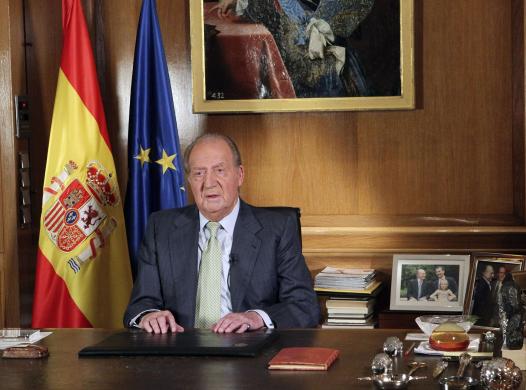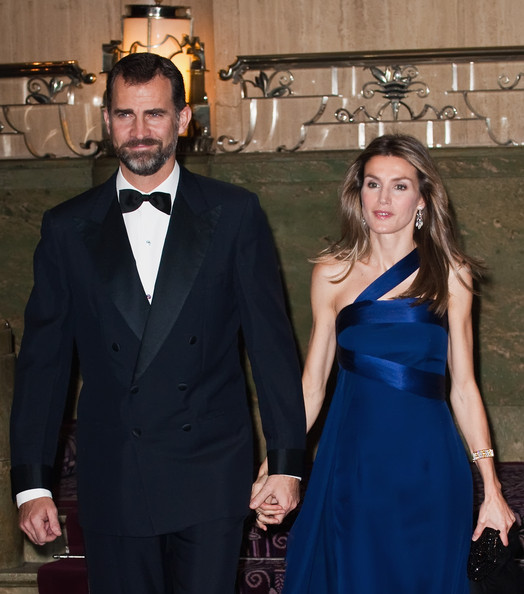
Spain’s King Juan Carlos delivers his statement at Zarzuela Palace in Madrid.
The King of Spain, King Juan Carlos, announced today that he is to abdicate the throne after 39 years at the helm.
With rumours of the King’s failing health circulating widely, Spain’s Prime Minister, Mariano Rajoy, confirmed on Monday that the King will abdicate the throne to his son, Crown Prince Felipe, with immediate effect…“His majesty King Juan Carlos has just communicated to me his decision to abdicate,” said the Prime Minister. “I hope that shortly, the Spanish court can proceed to name the current Prince of Asturias as King.” According to Rajoy, the decision of Juan Carlos to step down comes on the back of recent hip operations that have left him frail. An official announcement from the King is expected later today.
Although the idea of an ‘Heir to the Throne’ is a common one, Prince Felipe’s succession will be the first time since 1885 that a Spanish King has passed on the crown to his offspring. Having enjoyed a relatively trouble-free, popular reign, King Juan Carlos has come into criticism in recent years as Spain’s economy has suffered and the Royal Family has been deemed too out of touch with the common man.

Spanish Prince Felipe and Princess Letizia to become King and Queen.
However, since acceding to the throne in 1975 just two days after the death of General Franco (who appointed Juan Carlos as the next head of state in 1969), the King has generally enjoyed vociferous support throughout the country, not least for his pursuit of more democratic, forward-thinking policies that helped Spain catch up economically with the rest of Europe after decades living under a dictatorship.
As recently as 2012, a poll by Spanish national newspaper El Mundo found that the King had close to 80% approval of Spaniards. Last year, that support had reversed dramatically, with the same poll finding that nearly 70% of Spaniards thought the King should abdicate.
A long-running corruption investigation into the dealings of Princess Cristina – the King’s younger daughter – and her husband Iñaki Urdangarín helped to tarnish the Royal Family’s reputation, while the King’s ill-fated hunting trip to Botswana (where he was photographed brandishing a hunting rifle next to a dead elephant) harmed the King’s hitherto benign image.
Spain’s younger generation had come to view the King as a symbol of all that was wrong with the country – old, institutionalised and part of an old boys’ network of privilege and power. With jobs scarce and money tight, such an image did not fit alongside Spain’s projected desire to move swiftly into the 21st century.
Prince Felipe represents a more youthful, progressive and inclusive figure. His approval rating has always remained steady at around 66% in the polls, and commentators are already suggesting that Spain will become better off with Felipe at the helm. Time will tell whether this changing of the guard will have the desired effect, but for King Juan Carlos after 40 years in charge, he evidently felt that he could go on no longer.
 en
en



 Vlaams-Nederlands
Vlaams-Nederlands
0 Comments
Leave a Comment
DISCLAIMER
The opinions and comments expressed by contributors to this Blog are theirs alone and do not necessarily reflect the views of VIVA Homes Under the Sun Ltd, any of its associated companies, or employees; nor is VIVA to be held responsible or accountable for the accuracy of any of the information supplied.
Have you got something to say?